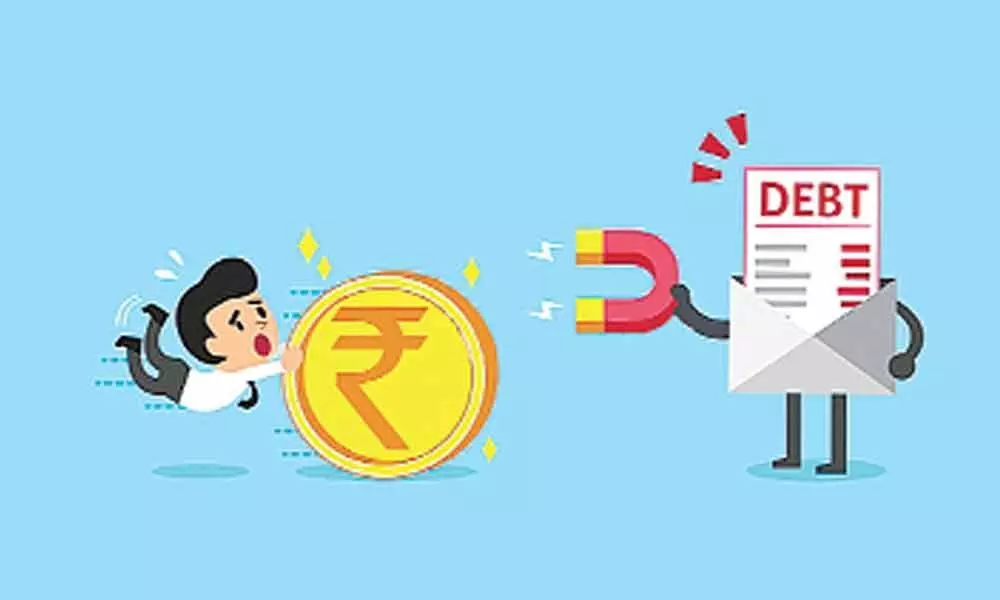Invest surplus money in stocks while repaying loans

Most of us (Indians) have ingrained belief that we shouldn’t be taking any debt. A generation earlier it was not really appreciated by their own family members to have taken any loan.
Most of us (Indians) have ingrained belief that we shouldn't be taking any debt. A generation earlier it was not really appreciated by their own family members to have taken any loan.
Of course, we've heard of bonded labour and private moneylenders fleecing borrowers with their high interest rates, etc.
Over the last few years though, with the availability of cheaper credit and consumerism, the attitude towards debt has changed.
Recent studies hint that there is a growing credit card usage and increased dependence upon credit by many consumers.
Also, analysts worry if the credit uptick is not growing at a positive pace quarter-on-quarter, it's hinted to a slowing economy or even point to the lack of confidence into the future (about economic prospects).
I don't want to paint that all debt is evil and there are some instances where opting for debt is good. This is even compelling when the government itself subsidises, if not discounts, the cost of capital such borrowings would be good.
So, a housing loan falls into this category which serves twin benefits of the individual's aspiration to own a house and the government plan of providing a safe roof to the citizens.
Hence, we see the interest upon the housing loans are arguably the cheapest forms of raising capital.
The government also doubles up the benefit through tax savings upon the interest paid on the loan and on the capital repayment, despite to only an extent, each year.
This is because of the multiplier benefits thus accrued for the entire economy is worth the incentives provided by the government.
The banker or the financier generally take into consideration the credit worthiness of an individual before issuing any housing loan.
The extent of the loan and thus the Equated Monthly Installments (EMI) are thus arrived taking into consideration of the repayment capacity, the tenure of earnings, the past credit history, etc., of the borrower.
Notwithstanding the various benefits (subsidy, tax savings, etc.) and the rationale behind the loan disbursement, most borrowers hurry to clear the loan before the committed period.
The prepayment of the loan is done primarily by foreclosing (repaying the outstanding loan), part-paying (topping up with lumpsum over the planned EMIs) and increasing the EMIs.
This is more to do with the mindset towards general debt and the psychological burden of having and getting rid of by clearing it than any proven rationale.
All I'm advocating here is that one should always explore productive and efficient avenues than to repay the loan.
Firstly, the interest rate on housing loan is low and would further reduce with the additional benefits (tax savings, etc.) and secondly, the opportunity cost of creating higher corpus through investing in equities, etc.
This is specifically true when the house loan is for a self-occupied property which nullifies the rental cost of having a decent shelter.
The other day I was discussing with another investor who would like to invest in real estate properties to create future inflows through rental income.
I've desisted him to go for loans in those cases as the cost of loan may mostly be higher than the rental yield.
Though, the ownership or asset is created the actual cost and benefits would further reduce. Of course, another argument in favour would be the appreciation of asset value.
But, that would be over a long period which would again saturate due to aging.
The tales of people investing small and profiting big is only one side of the real estate story and it's only on absolute terms.
What many people also forget is the fact that the property appreciation happens over a long period which actually is almost at the pace of a bank fixed deposit.
At least, in the latter case, one needn't bother about the location of the property, the completion, quality and the whole process of availing a loan, etc.
Each time there is a surplus money available during the repayment phase, I would recommend investing in equity and related instruments.
The ideal way would be to look for diversified equity mutual funds (MF) and invest in a staggered way over a period so that one ends up distributing the risk while also averaging the cost.
Of course, in times of situations where there is a temporary break in employment, one could still opt for a withdrawal and if it's a planned break, they could consider a Systematic Withdrawal Plan (SWP) which is tax efficient also to cover the EMI.
A counter perspective is that one clears the loan and starts a new Systematic Investment Plan (SIP) equivalent to the EMI.
This still is an option and the second best but the compliance of replacing the entire EMI with a new SIP is low and moreover the sanctity is lower as there is no threat for the individual, after all, humans are easy prey to their own emotions.
(The author is a co-founder of "Wealocity", a wealth management firm and could be reached at [email protected])










